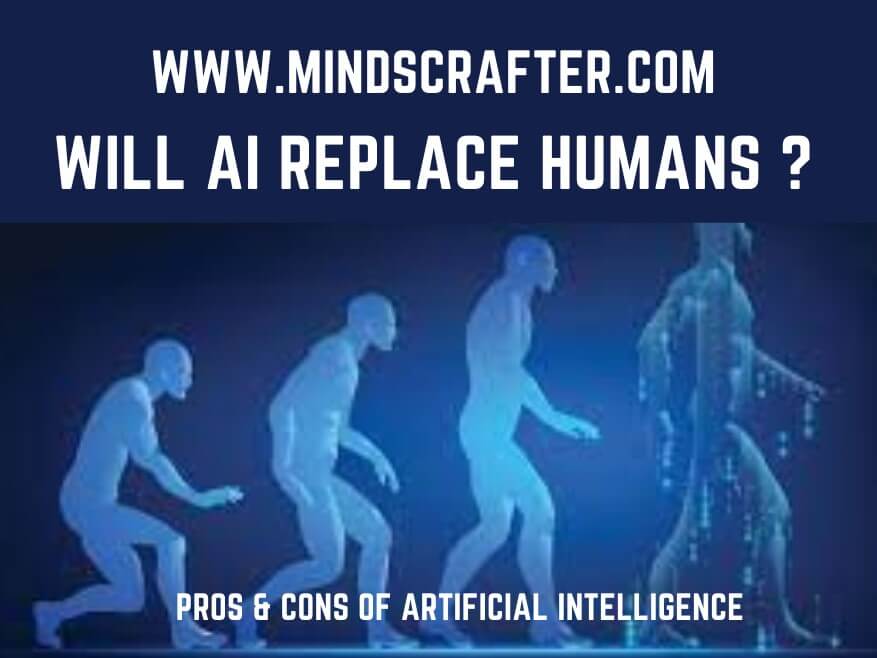As artificial intelligence (AI) technology advances, many people wonder if it will eventually replace human workers. While some argue that AI will create new job opportunities and increase efficiency, others worry about the potential loss of jobs and the impact on society. In this article, we’ll explore both sides of the debate and examine the potential pros and cons of AI’s impact on employment.
The Pros of AI in the Workforce.
One of the main benefits of AI in the workforce is increased efficiency. AI can perform tasks faster and more accurately than humans, leading to cost savings and improved productivity. Additionally, AI can take on dangerous or repetitive tasks, allowing humans to focus on more complex and creative work. AI can also provide valuable insights and analysis, helping businesses make better decisions and improve their bottom line. Overall, AI has the potential to create new job opportunities and improve the quality of work for humans.
While there is concern that AI may replace human workers, it’s important to note that AI does not replace human intelligence. Instead, it’s a tool that can enhance human capabilities and improve the overall efficiency of the workforce. For example, AI can assist doctors in diagnosing diseases, help lawyers with legal research, and aid in customer service interactions. By working alongside humans, AI can help us achieve more than we could on our own. As AI technology advances, it’s important to embrace its potential benefits while ensuring that it’s used ethically and responsibly
The Cons of AI in the Workforce.
One of the biggest concerns about AI in the workforce is the potential for job displacement. As Artificial technology becomes more advanced, it is increasingly capable of performing tasks that humans previously did. This could lead to significant job loss, particularly in industries like manufacturing and transportation that rely heavily on routine tasks. Additionally, AI poses a risk of causing economic disruption, especially if it displaces a large number of workers who struggle to find new jobs. This could have a ripple effect throughout the economy, leading to reduced consumer spending and slower economic growth. As such, it will be necessary for policymakers to carefully consider the impact of AI on employment and take steps to mitigate any negative effects.
<p>
The Potential Impact of AI on Employment.
The rise of artificial intelligence has sparked debates about whether it will replace humans in the workforce. While AI has many potential benefits in the workplace, there are also concerns about its impact on employment. One of the main concerns is that AI could replace human workers, particularly in industries that rely heavily on repetitive or routine tasks. This could lead to job loss and economic disruption, particularly for workers who need more skills or education to transition to new roles. However, some experts argue that AI could also create new job opportunities and increase productivity, ultimately benefiting the economy as a whole. It will be necessary to carefully consider the potential impact of AI on employment and take steps to mitigate any negative effects.
While it is true that AI has the potential to replace human workers in specific industries, it is essential to note that this is not a new phenomenon. Automation has been replacing jobs for decades, and AI is simply the latest iteration of this trend. However, it is also true that AI has the potential to create new job opportunities, particularly in fields such as data analysis and programming. Additionally, AI can increase productivity and efficiency, which can ultimately benefit the economy as a whole. This may include investing in education and training programs to help workers develop the skills they need to succeed in a changing job market.
The Future of AI and Human Collaboration.
While there are concerns about AI replacing human workers, many experts believe that the future of AI lies in collaboration with humans. AI can automate repetitive tasks, freeing human workers to focus on more complex and creative work. Additionally, AI can assist humans in decision-making by providing data and insights that humans may need help to gather. The key to successful collaboration between humans and AI will be ensuring that humans have the necessary skills and education to work alongside AI and that AI is designed and implemented in a way that is ethical and transparent.
While some may fear that AI will replace human workers, the reality is that AI has the potential to enhance and augment human capabilities. For example, AI can be used to analyze large amounts of data and identify patterns that humans may be unable to see. This can lead to more informed decision-making and better outcomes. Additionally, AI can automate repetitive tasks, freeing human workers to focus on more complex and creative work. However, it is important to ensure that AI is designed and implemented in a way that is ethical and transparent and that humans have the necessary skills and education to work alongside AI. Ultimately, the future of AI and human collaboration will depend on our ability to work together and leverage the strengths of humans and machines.
Preparing for the Future of Work with AI.
As artificial intelligence continues to advance, it’s crucial for individuals and organizations to prepare for the future of work. This means developing skills complementing AI, such as creativity, critical thinking, and emotional intelligence. It also means investing in education and training programs that teach individuals how to work alongside AI and utilize its capabilities. By embracing the potential of AI and preparing for its impact on the workforce, we can create a future where humans and machines work together to achieve tremendous success.
The question of whether AI will replace humans in the workforce is complex and lacks a clear answer. AI has the potential to automate tasks and improve efficiency, but it should complement and enhance human skills. We should view AI as a tool that makes us work smarter, not harder. To prepare for the future of work and thrive in a world with increasing AI presence, we need to invest in education and training programs that teach people how to collaborate effectively with AI. Ultimately, the key to success in the age of AI will be to embrace its potential while also recognizing the value of human skills and abilities.



Very informative post.
❤️Mind blowing
It’s wonderful and interesting topic u wrote on. According to my poor knowledge AI can only assist human services, can’t be replaced by Humans.
Thank God AI is Emotionless 😐.
Pingback: The Scope of AI in Pakistan